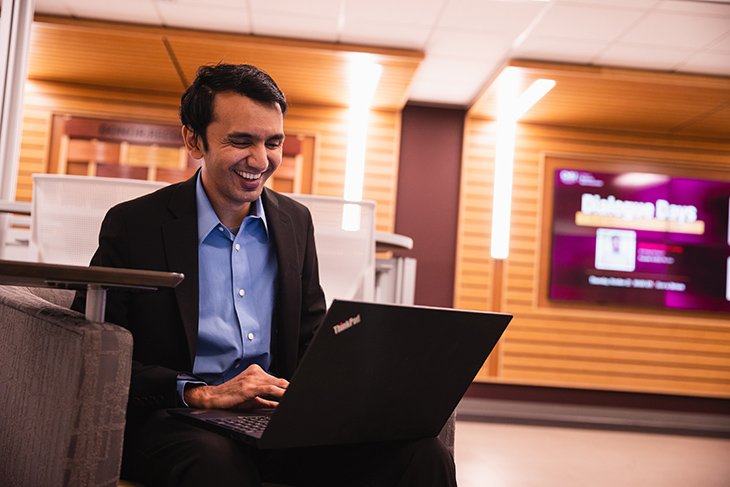CMU named a global leader in ‘process mining’ for business solutions
Only 14 institutions have earned the honor worldwide.
Move over, data mining: Process mining is here, and Central Michigan University has been named a world leader in teaching this up-and-coming career skill.
Celonis is a German process mining company that holds more than 60% of the global market. It has certified CMU a Celonis Academic Center of Excellence — one of only four in the nation and 14 worldwide. CMU shares this honor with elite schools such as the London School of Economics, Brigham Young University, Arizona State University, and RWTH Aachen University-Germany.
But what is process mining?
"It's really an x-ray of an organization," says Vishal Shah, the CMU business information systems faculty member who has worked with Celonis to secure the certification. He has created a new Honors capstone course — HON 321: Business Project Experience — focused on process mining with real-world clients.
Shah explains that we now have the capability to analyze and present information, in near real-time, from the wealth of data that nearly all modern organizations collect. The results can shine a light on an organization's operations, processes and performance — in short, what the organization is really doing, compared with what it thinks it is doing.
The field is booming. The global market for process analytics is expected to grow to $1.42 billion by 2023, up from $185 million in 2018 — a compound annual growth rate of 50%, Shah said. Experts, including the Harvard Business Review, advise businesses that they need to explore process mining. Through process mining, Siemens - a German multinational conglomerate, increased its automation by 24% and reduced rework by 11% globally. Uber saved over $20 million.
For CMU students, Shah said, studying at a Celonis Academic Center of Excellence promises to open doors.
He said Celonis hired people from capstone courses at other schools such as the College of William & Mary. The company usually opens up a separate job application process for students who perform well in these classes.
"Imagine taking a class and walking out with a high-paying job with one of the fastest-growing companies in the field of process mining," Shah said.
University Communications spoke with Shah about process mining and the Celonis certification.
For students or organizations, why is now the right time to focus on process mining?
Humans are drowning in data. At the beginning of 2020, the number of bytes in the digital universe was 40 times bigger than the number of stars in the observable universe, equivalent to 10 million Blu-Ray discs — a stack as tall as two Eiffel Towers — every day.
So we have all this data, but we lacked the ability to analyze it for a considerable time. With the advent of data mining and now process mining, scientists have developed algorithms that can be used to find patterns in data generated. Analyzing data is further accelerated by a decrease in the cost of hardware, storage servers, and processing power.
In a way, all our ducks — data, storage and processing, and analysis algorithms — are in a row. Thus, presenting the business world with an opportunity to understand their operations and performance at a much more granular level.
What types of businesses or organizations can benefit from process mining?
Any business with routines set up for its operations — financial, sales, purchasing, and manufacturing — can benefit. The appeal lies in its applicability across a vast cross-section of industries.
Think of when you buy something from Amazon.com. The whole shopping experience is a series of discrete steps: order, bill, payment, shipment, receiving your stuff. Now, millions of such orders are being placed per second. It would be impossible for companies to look for irregularities manually and ensure that they follow the proper order of steps. In these types of situations, process mining becomes relevant. It inspects millions of records in near real-time to find missing steps, bottlenecks, and opportunities for improvement.

What advice would you give to a business that's considering process mining?
Process mining can save a significant amount of money and rework. It can reduce inefficiencies in businesses ranging from technology companies to manufacturing firms. With process mining, firms would better understand where they should invest resources. Such insights become essential as the world strives toward a sustainable economy and values environmental, social, and governance goals beyond traditional financial metrics.
CMU's annual ERPsim competition is one example of the College of Business Administration's focus on enterprise resource planning systems. It focuses on the ways organizations allocate money, material, and people to get things done. So, how does process mining fit in with ERP?
ERP and process mining are like carrots and peas: They complement each other and move in unison. Due to CMU's long-term vision, we adopted ERP and SAP (the leading ERP software) more than 20 years ago. It has paid us great dividends and continues to do so. ERP systems essentially capture an organization's business processes and generate all the process data at the transaction level — for example, sales orders. All of these process data can become the input for process mining. So, CMU is sitting on a mountain of process data generated by its ERP system, ready to be process mined.
Also, nearly all firms that employ ERP — and all Fortune 1000 firms do — will likely employ process mining given the convergence of the aforementioned factors: data, storage and processing, and analysis.
Most of the firms and industry mentors that support our ERPsim competition also are interested in exploring the application of process mining to their data. If CMU offers them that opportunity, it will cement CMU's legacy of innovating and being a first-mover.
What does the future hold for process mining in CMU business education?
Many great things! My goal is to inculcate process mining in business information systems and potentially Bachelor of Science in Business Administration curricula. We are uniquely positioned to do so, given the long-term strategic investments in ERP systems. Process mining completes these investments and builds on them, further enhancing our offerings and helping CMU students become job-ready problem solvers.
I also am working with Celonis to organize a college-wide Datathon. First, students will be given a real-world data set like those generated by ERP systems. Then, student teams will compete with other teams to understand and mine the process using Celonis. I am working on setting the parameters for these events.
Celonis certification is open to faculty members, too. As more faculty members get introduced to process mining, we will find innovative ways to employ process mining in CMU classes.
About the expert
Vishal Shah is an associate professor of business information systems in the College of Business Administration and has been at CMU since 2015. He is associate director of the SAP Next-Gen University Alliances Program. His research and teaching interests include data analytics, ethical artificial intelligence, technology-mediated learning, and ERP systems. He earned his Master of Science degree from Texas A&M University, College Station, and his doctorate from the University of Arkansas-Fayetteville.




